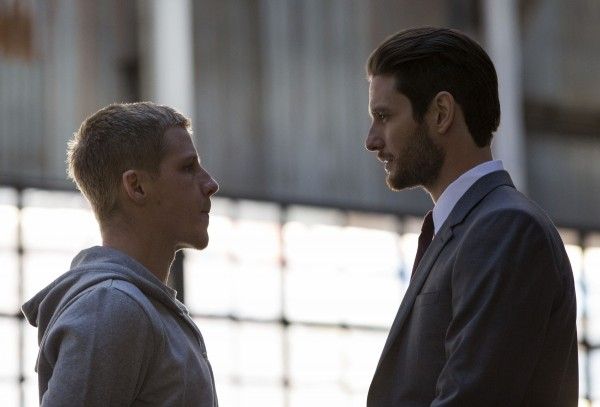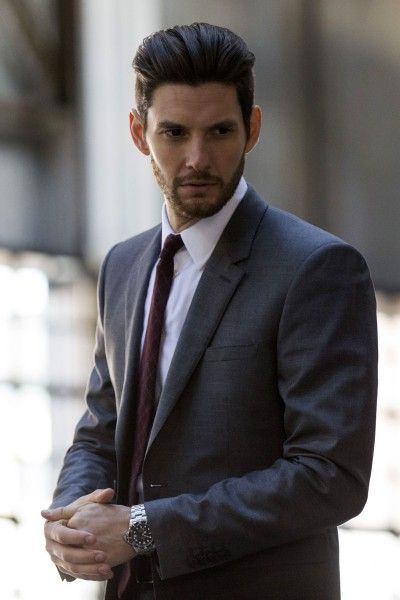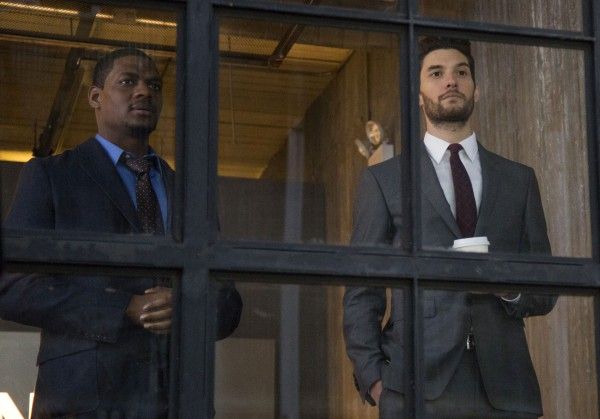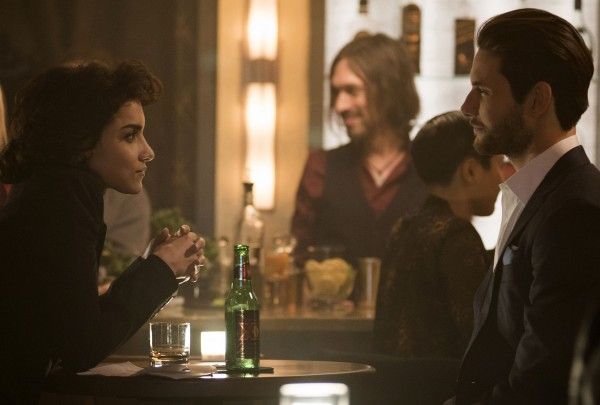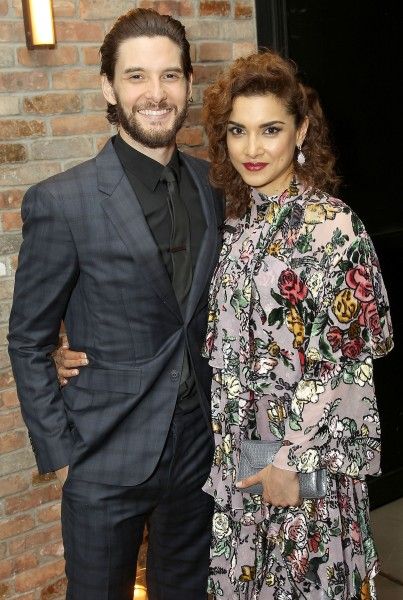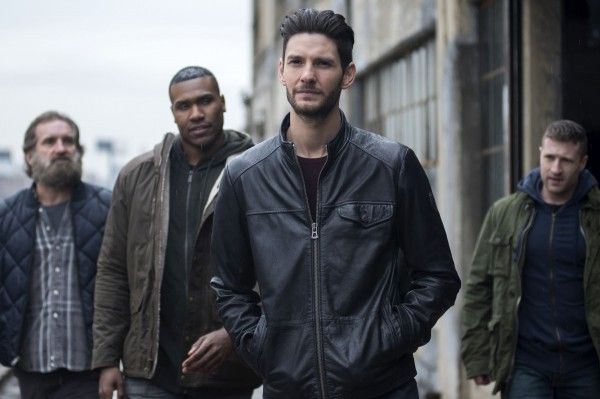From showrunner Steve Lightfoot (Hannibal), the Marvel/Netflix series The Punisher follows Frank Castle (Jon Bernthal), who mistakenly thought he’d be able to disappear into a quiet life, now that he was finished exacting revenge on those responsible for the death of his wife and children. But when he uncovers a conspiracy that runs far deeper than New York’s criminal underworld, The Punisher must discover just how far and deep the injustices run.
During this 1-on-1 phone interview with Collider, actor Ben Barnes (who plays Billy Russo, Frank Castle’s best friend from his days in the Special Forces) talked about what got him most excited about The Punisher, doing the research to make everything as authentic as possible, being on a superhero show where the superheroes have no powers, the Cain and Abel dynamic between Frank Castle and Billy Russo, how Jon Bernthal pushes him, as an actor, the possibilities for future seasons, and whether it was more secretive to work on The Punisher or HBO’s Westworld, for which he’s returning for Season 2.
Collider: You’ve gone from doing Westworld to doing The Punisher. Which show was more secretive to work on and be a part of, and do you now feel like one of the best secret-keepers, ever?
BEN BARNES: I really do! The truth is that I really struggle with it ‘cause I really want to be able to share things. Half the reason you get into this business is to be able to tell stories and share stories, and I sit there at every social thing that I go to, biting my tongue about everything, all the time. And now I’m involved in the second season of Westworld, which is even more secretive and I know even less about it, this time. I’m not even getting the full scripts, this time. All I know is that it’s absolutely wild! It’s funny because Westworld is very, very secretive and our showrunners really enjoy keeping the secrets. I think they should be extremely proud of the way that they shape the series, and they want to keep it close to their chests because they don’t want to keep it spoiled. In the Marvel world, they’re just very used to keeping secrets. They’re very used to that mode of working. There’s a worldwide army of people who are always curious to find out what’s gonna happen, so that they can get their fill and fix of how things are going to play out. I completely understand the way that they do it, but it’s frustrating.
With as popular as comic book and superhero movies and TV shows are now, who in your life is most excited that you’re now a part of this Marvel world?
BARNES: I have a couple of close friends in L.A., who are self-confessed comic book nerds, and they were very, very excited about it. They launched into explaining to me why I should be more excited about it. The thing that excited me about it was almost the exact opposite. It’s not that I get to play a character from the Marvel canon. It’s that I get to play a character that we do discover in the Marvel universe, but I get to have a completely fresh, almost original, take on him and I get to have some input into how he’s shaped. His backstory is very different from that in the comics, in our story, and I think it actually works on a much deeper level, in terms of his relationship with Frank Castle. There’s a huge amount of scope for where it goes, and it leaves a huge amount of scope, if there are more seasons of it. There are lots of open-ended questions about how he might be. I was excited about the differences between what are in the panels of the comic strips and the Billy Russo in our Netflix show.
This is a property with a massive fan base, but that comic universe is married with the military aspect of this story, which is very real for a lot of people. What sort of research did you do, on both of those accounts?
BARNES: Jon [Bernthal] very much leads the way, in terms of shouldering that responsibility. He feels very deeply that he needs to be as authentic as possible, in a superhero universe, in terms of the military aspect because there are a lot of American men who are a part of these institutions. I can’t begin to tell you how many Punisher skulls I’ve seen, now that my awareness is heightened. It’s on trucks and hats and tattoos, and all sorts of things. It’s very much in the American male consciousness, and Jon shoulders that responsibility very heavily. I was newer to it, and I found myself watching lots of Special Forces documentaries and looked at their training documentaries. I met up with a couple ex-Special Forces soldiers that relayed some of their experiences to me and trained me, in terms of their movements and how they would move with their various weaponry. And then, there was stunt training when I got to the set. It’s set in this world that’s very modern Brooklyn, so when we started shooting, I would go do boxing training, and then I’d just walk around Brooklyn in the middle of the night and drink it in. You could feel emboldened and like it’s your city, and that was as important for me, in terms of research, as anything.
Were you surprised to find yourself on a superhero show where the superheroes don’t actually have powers?
BARNES: I was thrilled to find myself in that situation because I imagine the conversations that must happen, which are like, “Well, why doesn’t Superman use his laser eyes, all the time?!” We don’t have any of those constrictions. We are able to always defer to the question of, what would you do? We have a military person that we can consult on what we’d do in any situation. It’s about how I think Billy Russo would react in a situation, like any real human character. They’re all complicated characters with checkered histories and traumatic pasts. All the characters are struggling. The protagonist is struggling with PTSD, and they’re all dealing with their trauma in different ways. Billy has smoothed over this perfect distance for himself, and you can smell that it’s not real, from the get-go. I think that gives us license to create a much more gritty and grounded world. It’s a world of superheroes that people will appreciate.
Billy Russo seems to be more antagonist than straight villain, and when I spoke to showrunner Steve Lightfoot, he described the relationship between Frank and Billy as Cain and Abel, and as brothers who are at each other’s throats. Do you see Billy as a guy who’s trapped by circumstance, or is it a circumstance that he’s created for himself?
BARNES: Any time you play a character who has moral ambiguity or different colors to him or gets into conflicts with a character you know that the audience is going to be behind, you have to believe that the path you’re treading is the right one and that the actions you’re taking are justified, for whatever reason. Frank has obviously been through a lot, but Billy is dealing with a very traumatic childhood, the trauma of war, and the trauma that he suffers in the show, going forward. There are layers to how broken he is. Frank is certainly very damaged, but Billy is broken, even though he might come across as very together, form the get-go. That was very interesting to me, to see how the cracks reveal themselves. I didn’t want to plan it too much. I wanted to see where it would take me. They are brothers. Frank refers to Billy as his brother, many times in the show, and Billy is the one who can make Frank laugh. That is explicit. They are close. They understand each other and have a shorthand with each other. That fuels any kind of conflict that might arise between them, even if it’s just differences of opinion or approach in what they believe to be right and wrong. We’ve all got friends, in real life, that might differ from us on certain ideologies or approaches to things, and you find it very, very difficult to communicate with somebody when you realize that they don’t see the world in the same way that you do. This isn’t any different from that.
Would you say that your character is much more thought out and deliberate in his actions and what he does than someone like Frank Castle is?
BARNES: Frank is very spontaneous and instinctive. When the fuse is lit, he wants to react and his instinct is to be violent, which is not necessarily the right choice. Violence is usually not the answer, and there are characters in this universe that remind him of that, but he is an anti-hero. He’s somebody who suffers, so his instincts are not always the right thing. Billy is certainly a very savvy, calculating character. Frank refers to him as being more clever than him. He’s someone who is a tactician, but is also somebody who’s probably less scrupulous than some of the other characters.
In what ways would you say that working with Jon Bernthal really pushes you, as an actor?
BARNES: He’s an incredible leader. He came in for the first read-through of the first episode and shook everybody’s hand. He makes you feel confident that he’s got this. He obviously had the added advantage of having played the character before. The most anxious part of a job is when you haven’t laid anything down on film yet and you’re not quite sure how it’s gonna sound or come across. He had the advantage of having done that already, and he filled everyone with confidence, knowing that he was going to bring this very complex anti-hero, in all of his savagery, to life. When you have that confidence in him, you trust him to do that. He’s very gentle and charming man, in real life, and then he switches the Frank switch and it can be very unnerving to see it unfold in front of you. For me, physically, he sets the pace. Sometimes we would shoot some of the flashback scenes very early in the morning or we’d have these long war days, and then we’d wrap at 11 o’clock at night and he’d be like, “Benny Barnes, we’re goin’ to the gym. You comin’, brother?” And there’s no way that you can say no to that man, in that moment. You want to bend over backwards to make him proud.
Billy Russo is the best-dressed character on the show, but he’s also the guy who ends up the least dressed, at times. How would you describe his relationship with and interest in Dinah Madani? Is he genuinely interested in her, or is she a means to an end?
BARNES: I think that initially, when their characters discover each other, there is a shorthand between them, in the same way that there is a shorthand between Frank and Billy. They understand that they have a shared history. They see, in the other person, an understanding of what it means to have been in the Middle East and what it means to experience that. When you find people in life that have a shared history with you, that is propellent in finding an intimacy with them. There’s a catalyst in that, but then it also becomes a cat-and-mouse game, where you’re not quite sure who’s the cat and who’s the mouse. You wonder if they’re both trying to squeeze something more out of this relationship than is evident or that they would tell each other. In the end, it’s about who’s willing to push the furthest to get what they want, and who’s willing to care the most or care the least. That’s where the tension from that relationship comes from.
By the time people get to the end of this season, would you say that you’re more or less scared of the reaction you’ll get to where Billy Russo ends up than the reaction you got to your character on Westworld?
BARNES: I’m more anxious about this. The responsibility on Westworld was laid much thinner, across a multitude of extraordinary actors playing all sorts of different things. There was no expectation of what Logan was going to be like in Westworld. Whereas for those comic book fans across the world, there is an expectation of how The Punisher should be and, on some level, there is some expectation of how Billy Russo is going to be, and it’s not what people think it will be. There’s certainly a level of anxiety for me. I really hope they feel that Billy is a worthy companion and antagonist for Frank.
The Punisher is streaming on Netflix.


